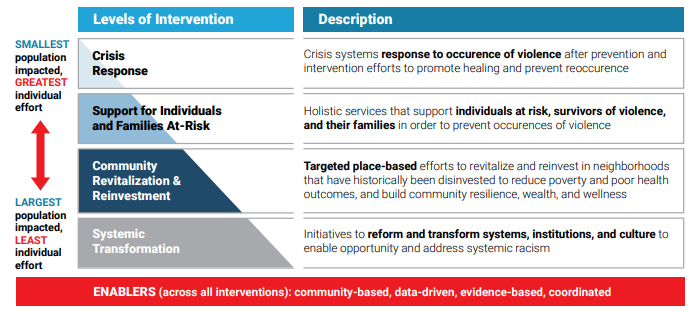Strategy and Framework
Last updated on 3/20/2024
Overview
The Community Safety Coordination Center (CSCC) works across City departments to implement a comprehensive approach to address the root causes of community violence - trauma, lack of educational and job opportunity, and community blight. Our work includes near- and long-term strategies to create safe spaces, support residents in addressing their individual and family needs, and promote a culture that leads towards community wellness and safety.
- Community Engagement – Through the dedicated work of our community engagement managers, we foster vital connections, deliver essential resources, and facilitate community events and safe space activations. The managers serve as bridges between the community and the City government.
- Rapid Response – We promptly allocate City resources and services to areas with a high risk of, or ongoing, gun violence. These efforts include resolving issues that pose a public safety threat such as street and alley lighting, graffiti removal, vacant lots, and abandoned buildings. We also coordinate City processes and resources like street closures, permits, lighting, and security.
- Culture Building – Working closely with community stakeholders, we co-create and implement initiatives that advance a narrative that supports communities most impacted by violence, drives behavioral change toward individual and collective wellness, and create a culture of empowerment for building community safety.
People's Plan for Community Safety
Launched in December 2023, the People's Plan for Community Safety is a community-led initiative that unites Chicagonas from all walks of life to address historic disinvestment, work towards healing our communities, and make all of Chicago safe for everyone. Led by the Mayor's Office for Community Safety (MOCS), this work harnesses the full force of government, community organizations, businesses, philanthropy, and more to solve a decades-long problem in a new way.
Community Safety as a Public Health Framework
The CSCC has worked with all City departments and sister agencies, many of which have existing programs or strategies to address community safety, to ensure a comprehensive and coordinated approach to violence prevention. The City developed a public health framework for community safety to implement a whole-of-city approach to violence prevention and ensure equitable investment in the communities with the highest levels of disinvestment and lack of opportunity. The framework was instrumental in understanding the wide array of violence prevention programming in the city of Chicago. In August 2022, the Community Justice Action Fund’s inaugural City Violence Prevention Index and scorecard ranked Chicago among the top cities in the nation for achieving the broadest range of violence prevention programs, services, and policies.

Origin
The Community Safety Coordination Center (CSCC) was created to take the lessons learned from the COVID-19 pandemic and apply them to the City's most pressing epidemic: gun violence. This means coordinating a whole-of-government approach that is data-informed, evidence-based, and community-driven. In its early stage of development, the CSCC was comprised of representatives from the City’s infrastructure, social services, and public safety departments. Currently, the CSCC is part of the Chicago Department of Public Health and works alongside the Office of Violence Prevention to reduce violence through outreach, victim support, and intervention services as well as support for victims of gender-based violence and initiatives to improve City coordination strategies and response methods which address root causes such as trauma, community blight, and lack of opportunities.

